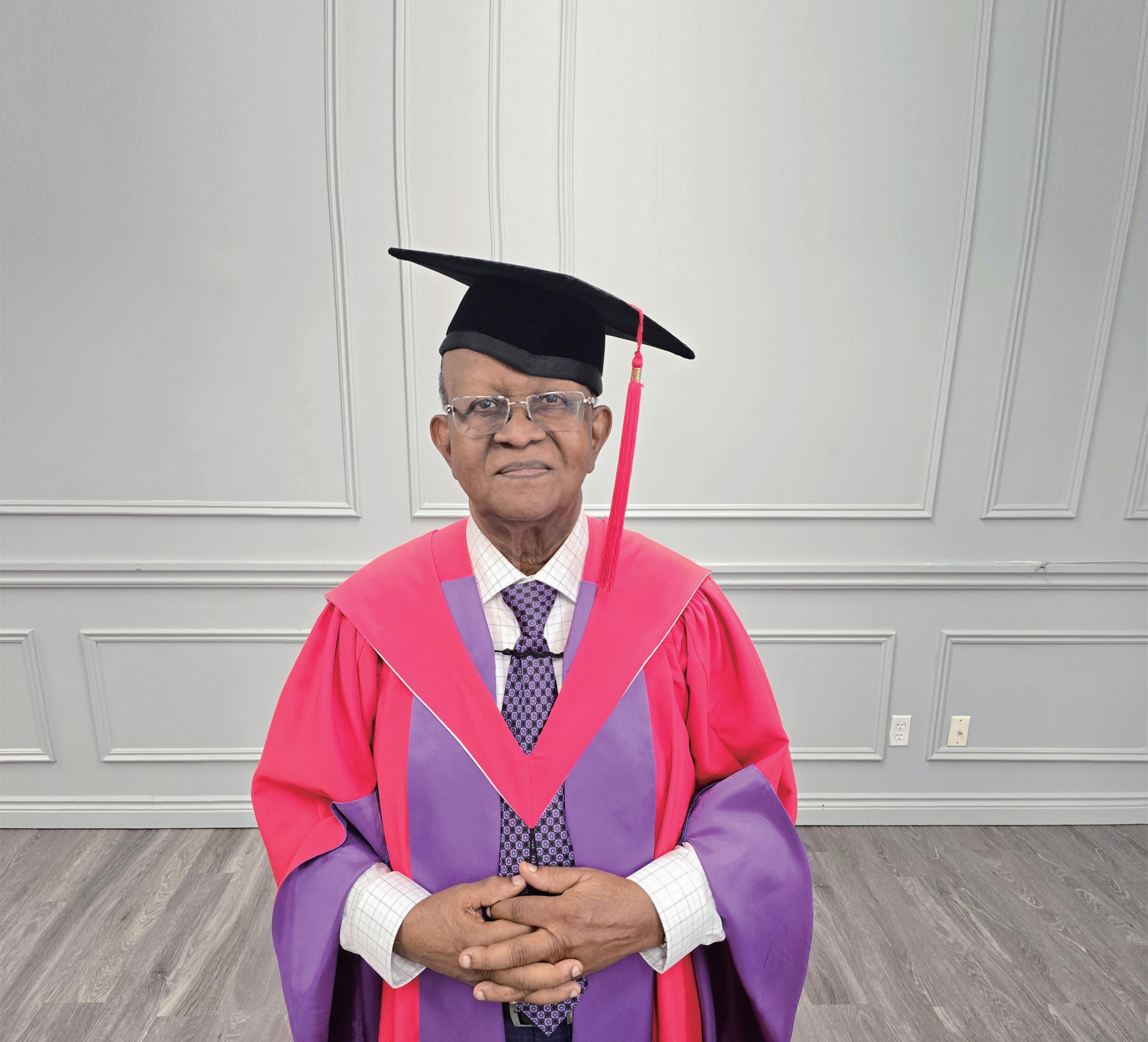









“I didn’t go to school just to be a journalist”, Share Publisher ARNOLD AUGUSTE said in his convocation address at York University last month where he was conferred with an honorary Doctor of Laws degree. “I wanted to be a journalist in the Black community.” See story on page 7. Photo by Ron Fanfair
By ARNOLD A. AUGUSTE, Publisher/Senior Editor

n his Canada Day message, Prime Minister Justin Trudeau said that Canada is the greatest country in the world. He had to say that. It’s his job. And, to admit anything less would be to admit that he has not been doing a good job.
But is Canada the greatest country in the world? I don’t think it is.
Of course, I can’t know for sure since I have not lived in any other country except my birth country, Trinidad, which I left some 54 years ago. I am sure that there are myriad other countries where life is good, great even, and where its citizens and residents would swear were the greatest and best.
To consider our (or any other) country as the best or greatest would mean that we are largely free of serious issues, that the majority of our residents are living the life and that we have attained a level of excellence
not experienced anywhere else.
And that we are not.
Canada has been good to me. It provided me with opportunities that I don’t know I would have had anywhere else. Maybe I would have done well somewhere else because I am quietly very ambitious. But I know what this country gave me.
When I arrived here 54 years ago this year, I had no idea what my life would be like. I had no plan. I had no relatives or friends to lean on, very little money and, of course, coming as a visitor, no papers.
But I knew that there were opportunities here that were not available to me in my birth country; that there was more to my life than was possible until then and that this is where my future lay.
So, when my application for landed status was denied and I was given 17 days to leave the country, I refused to allow that immigration officer to determine my fate, my future.
It took me a while but, thanks to a program of the then Liberal government of Pierre Elliot Trudeau, I was eventually
granted landed status and as soon as was possible I became a citizen of this wonderful country.
While I never had to depend on government assistance, I owe a lot to new Christian friends I met in church, mostly from Trinidad and Jamaica, whose generosity of spirit sustained me through those early lean years.
One of the first things I did after being landed was to apply to go to university. Before coming here, that wasn’t even a dream. As a young person, whenever I walked by Queen’s Royal College or passed by Fatima and St. Mary’s colleges in a taxi I always looked at the buildings wistfully knowing that I would never darken their hallways. The possibility of attending the UWI (University of the West Indies) was even more remote.
But here I was. I was not only able to attend university but to use the training and knowledge I gained there to build a business from the ground up and provide employment for many over the past 46 years, some of whom have gone on to
greater things.
More importantly, I was able to provide a vehicle to promote and to celebrate those in our community who have taken advantage of the opportunities available to them to achieve amazing results and to tell their stories which may never have been told anywhere else.
I have a deep sense of gratitude to this country. It is my home. And while I have been able to visit many other countries, there are few things more pleasurable for me than to come home to Canada.
But we are not perfect. We are not the greatest or the best, with all due respect to our Prime Minister. Not when so many of our fellow citizens are unhoused or underhoused. Not when so many of our fellow Canadians are sleeping on the streets, in tents and under bridges, many having found themselves in such dire circumstances through no fault of their own. Not when so many of our working families have to depend on food banks. Not when some of our people have to go to other countries and
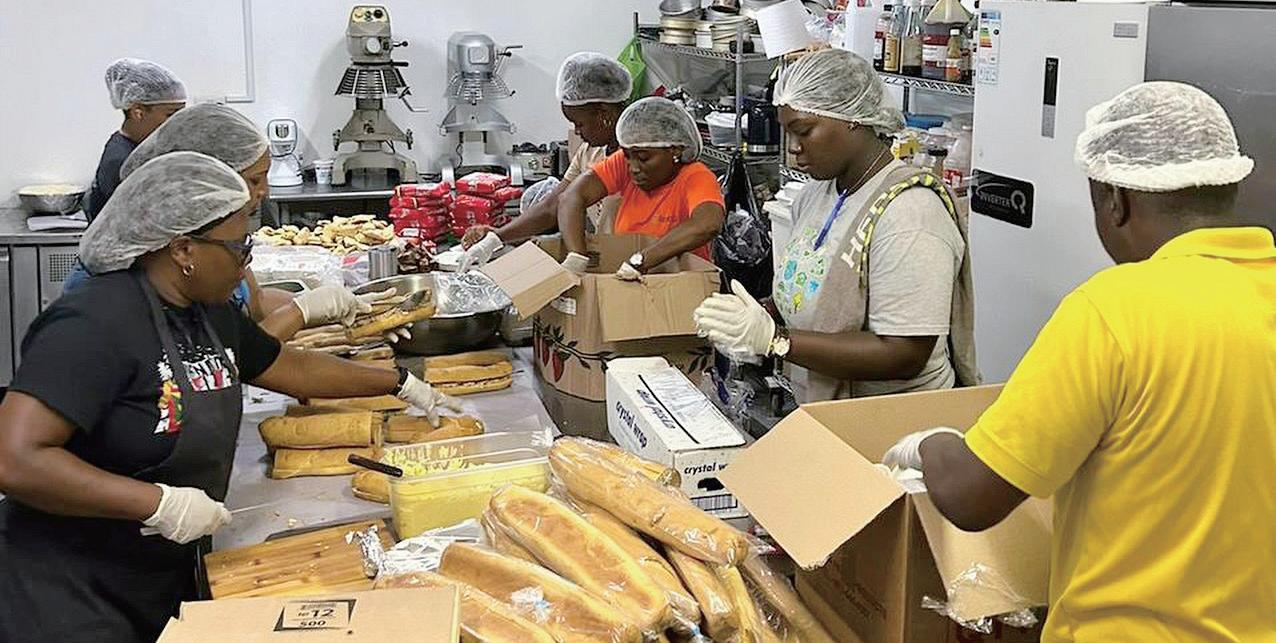

By LINCOLN DEPRADINE
A massive mobilization of items and money across Canada continues, as in dividuals and organizations respond to calls for assistance from the Caribbean, where Hurricane Beryl has left a trail of death and destruction.
Loss of lives was reported in Jamaica, Venezuela and St. Vincent & the Grena dines, as well as on the tri-island state of Grenada, Carriacou & Petite Martinique.
While extensive damage was reported in some parts Grenada, where a man died after a tree fell on his house, it’s on Carriacou – where at least two fatalities also were blamed on Beryl – and on Petite Martinique, that the hurricane’s aftermath was described as “Armageddon-like” by Grenada’s Prime Minister Dickon Mitchell.

Beryl left about 98 per cent of properties on Carriacou and Petite Martinique damaged or destroyed, and wreaked “complete devastation and destruction of agriculture” on the two islands, said the prime minister, who is also minister responsible for disaster management.
“There’s really nothing that can prepare you to see this level of destruction. It is almost Armageddon-like,” said Mitchell. “Almost total damage and destruction of all buildings, whether they be public buildings, homes or other private facilities.”
Mitchell predicts that Grenada would require millions of dollars to clean up from the hurricane and to re-build.
“Clean up alone will run into tens of millions of dollars,” he said. “The Minister of Finance has already written to some of
our multilateral partners to indicate that this catastrophic event has happened and to trigger our debt suspension clause with some of these agreements.”
The cabinet of ministers, which is chaired by the prime minister, also plans on establishing a task force “to do a detailed assessment of the loss and damage that Grenada, Carriacou and Petite Martinique have suffered in the areas of agriculture, fishing, housing, public buildings, private buildings and public infrastructure and the environment”, added Mitchell.
“We need to make sure we record accurately the lost, the damage, and that we are able to qualify this, because it has significant implications for the economy of Grenada, for the government’s fiscal
By RON FANFAIR
The Ontario College of Art & Design University (OCAD U) was already on Dr. Lesley-Ann Noel’s radar when a recruiter contacted her last fall about an opening for a dean in the Faculty of Design.
About a decade ago in Raleigh, North Carolina and at the Hue Design Summit in Atlanta in 2019, Noel met Dr. Elizabeth ‘Dori’ Tunstall, the first Black dean of a Design Faculty, who left Canada’s oldest and largest art & design education institution last July.
She was aware of some of Tunstall's groundbreaking work at OCAD U as part of her commitment to decolonizing the space and making it more diverse and equitable.
She had also collaborated on a few projects with Dr. Renata Leitao who taught in OCAD U’s graphic design program and completed a postdoctoral fellowship under Tunstall’s supervision.
Not surprisingly, Noel did not hesitate to apply for the role when the opportunity arose.
“I was not planning to move, but these opportunities do not come up daily,” she said. “I decided to throw my hat in the ring and see where the conversation goes. Renata told me how good OCAD U will be for me and Dori’s legacy meant a lot.”
At the start of this month, Noel joined
OCAD U as the Design Faculty’s Dean, following Tunstall as the second Black Dean to hold the position globally.
She comes to the university after three years as an assistant professor at North Carolina State University. Before that, she spent two years at Tulane University as Associate Director of Design Thinking for Social Impact.
The Trinidad & Tobago-born educator is well positioned to lead OCAD U’s Faculty of Design in enhancing studio-based learning, promoting entrepreneurship, securing additional design collaboration and advancing decolonization and equity to enrich the student learning experience.
The Board of Governors approved her five-year appointment last March.
“Dr. Noel is the kind of interdisciplinary design practitioner needed to support our students and faculty now,” said Vice-President, Academic & Provost Dr. Caroline Langill who chaired the Search Committee. “We believe she will be inspiring and forward-thinking in her new role as the Dean of the Faculty of Design.”
Reporting to Langill, Noel will be responsible for the faculty's educational and research leadership, development and supervision.
“I see OCAD U as a very vibrant and
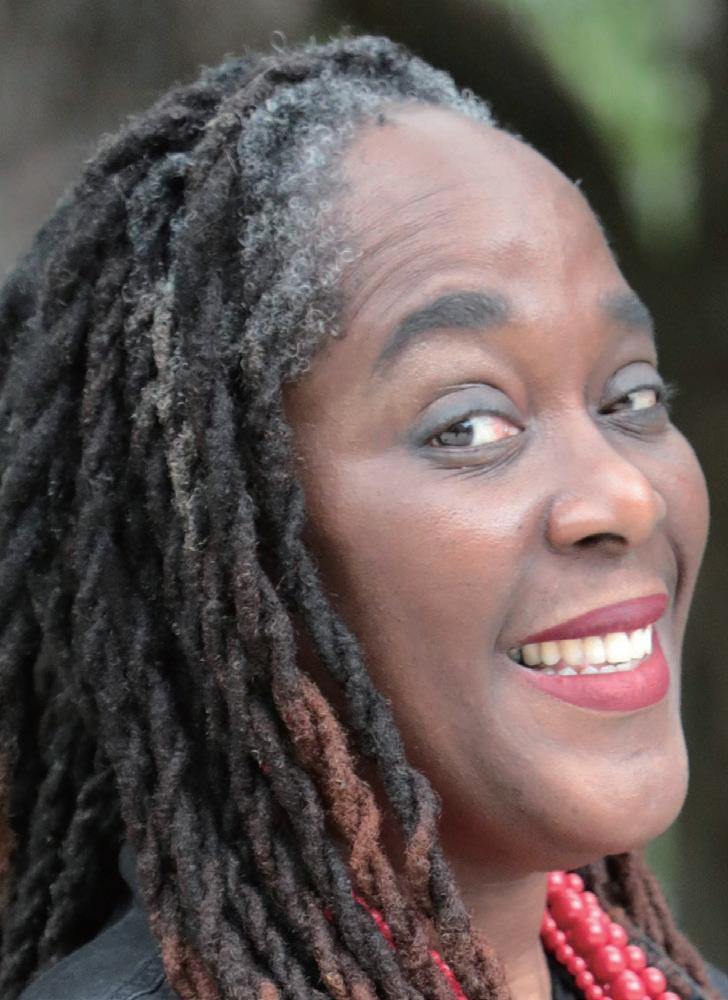
diverse space with so many interesting areas of design,” she said. “I think that is part of what the appeal is. This university is an exciting place to be. I also find it as a place that is challenging and that is redefining the way design is done.”
Noel made her first visit to Toronto last November to meet the selection committee.
“I was shocked at how familiar it felt,” she said. “I messaged a few people to let them know I would be in the city. It was a busy three or four days as I met folks I attended high school with and some I worked with in various capacities. I felt quite comfortable even though the weather was cold. Also, the diversity was evident as I walked around the city. I brought my husband and son and we loved the intentionality of the Indigenous culture messaging and the other experiences.”
It was Noel’s second visit to Canada after spending two weeks at the University of Montreal in 2011.
One of the people she did not meet was close friend Michael Lee Poy who is an Assistant Professor of Design at OCAD U.
The Trinidadian, who was among five new permanent faculty hires in 2020 in recognition of the International Decade for Peoples of African Descent, was busy at the time.
Lee Poy met Noel two decades ago when he was an academic liaison for Trinity College Global Site under the supervision of Trinidadian actor/playwright Tony Hall. In 2014, Noel – then the Visual Arts Coordinator at the University of the West Indies (UWI) Department of Creative & Festival Arts –hired him in the undergraduate design program and later in the Creative Design Entrepreneurship graduate program as an adjunct professor.

“During this time, we recognized the lack of support for the design industry in Trinidad & Tobago and the region and organized the Ministry of Design Colloquium,” said Lee Poy.
The Moko Jumbie advocate also assisted Noel in the UWI/Stanford University-hosted Design Thinking workshop five years ago.
“Dr. Noel is bringing her wealth of experience in the design fields and academia,” he said. “She is at the forefront of the discussion on design, equity and social change/justice. Most importantly, she will bring her Black Caribbean woman magic to the Black ecosystem that was established by Lillian Allen (she has been teaching Creative Writing at OCAD U since 1992) three decades ago.”
Believing that everyone can design, Noel strives to ensure that students understand design is practiced in a lot of places and it can be done in many different ways.
“I think design is as fundamental as eating and cooking,” she said. “We all go through the kinds of questions designers go through daily. But some of us do additional training in design. Coming to OCAD U, I would like students from such diverse backgrounds to understand the way you practice design will depend on who you are, your identities and the kind of questions that interest you. There are many situated ways of asking design questions and then answering them through research processes.
By RON FANFAIR
Jamaican-born Chris Campbell is the first Black President of the Carpenters Union Local 27 in its 140-year history in Ontario.
Part of 30 Locals across Canada affiliated with the Carpenters’ Regional Council, the labour organization represents over 8,000 members working in a variety of skilled trades, including carpentry and resilient flooring.
“I want to continue to build on the legacy of previous presidents and leadership,” said Campbell. “It is an honour to serve as president, representing all members of the Carpenters’ Union. I am eager to continue fostering growth and strengthening the relationships between our membership, executive board, representatives and administrative staff.”
Migrating to Canada over three decades ago after attending a technical school in Kingston, Jamaica, he did not have the financial resources to attend university.
Campbell became a Local 27 member two years after arriving in Canada in 1987.
“My dad and uncles were tradespeople,” he said. “I went back to the family tradition. I hooked up with a mentor who directed me to the Carpenters’ Union. That is how I got started. My journey to the presidency has been one of commitment, sacrifice and perseverance.
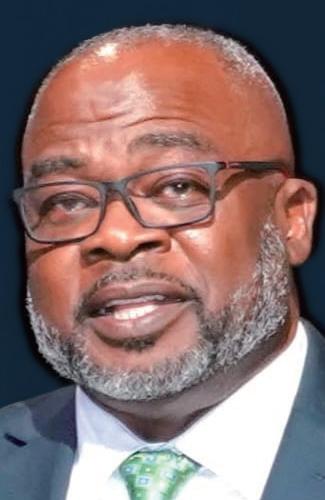
Former president Mike Yorke encouraged Campbell to attend union meetings and become involved in the process.
“I saw representatives that looked like me at the podium and that influenced me,” said Campbell. “Representation matters. Since then, when people in the community see me sitting up there at the podium, they tell me I inspire them to get involved. I feel I am just paying it forward.”



Comprehensive Medical Consultations
Chronic Disease Management
Preventive Care and Health Screenings
Home Healthcare for the Elderly
Mental Health
Weight Loss Management



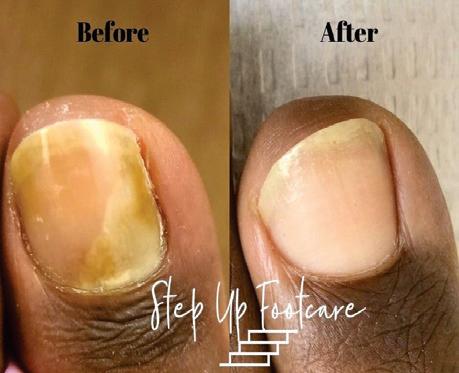

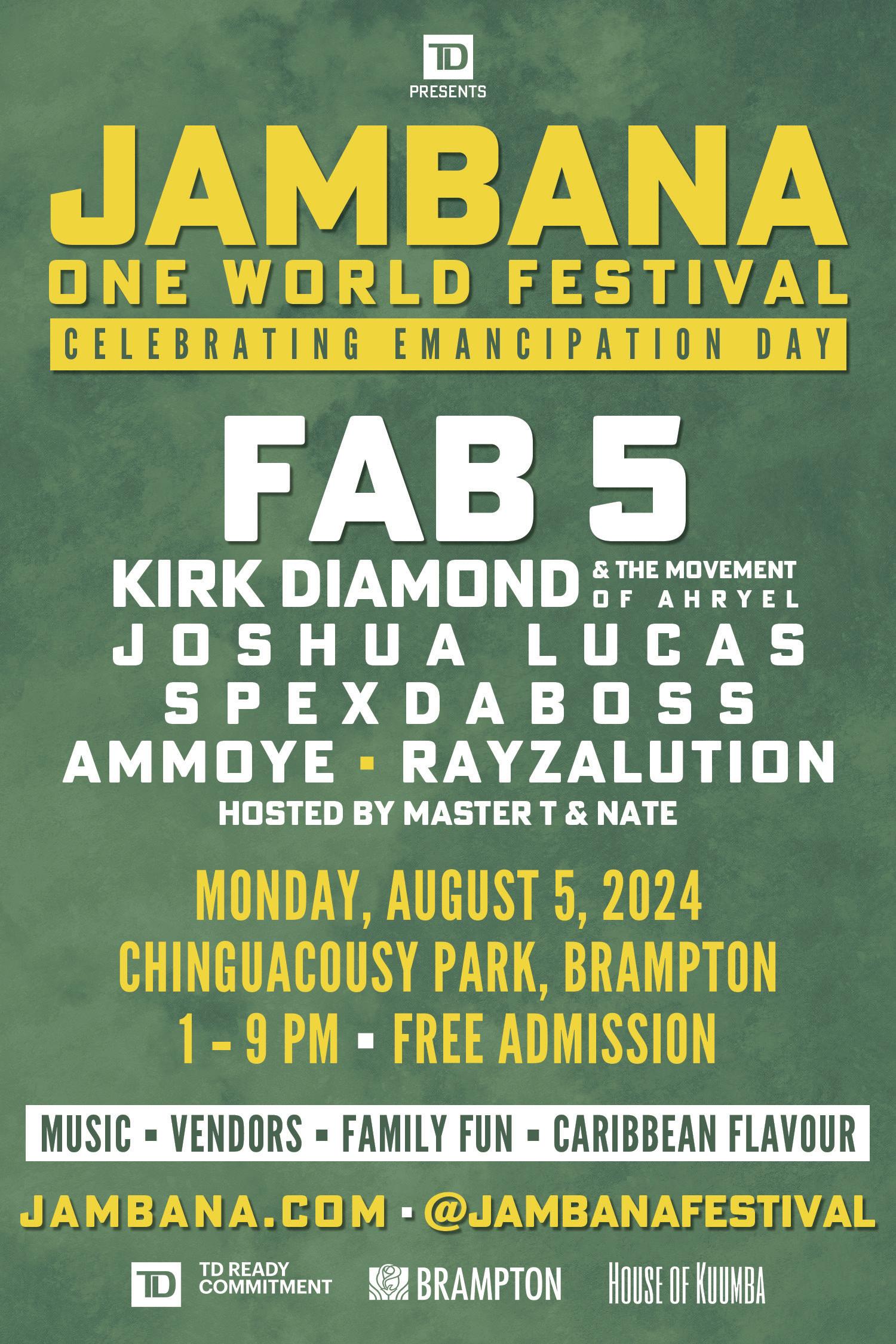



By RON FANFAIR
Longtime sustainable food systems developer Anan Lololi has been recognized with a George Brown University’s honorary Bachelor of Commerce (Culinary Management) degree.
Lololi is the past executive director of the Afri-Can FoodBasket that he founded in 1995 to promote community food security, food sovereignty and food justice in Canada, North America and the Caribbean.
“In recommending you for this honour, we recognize your incredible contributions to the City of Toronto and your integral work and efforts for food security,
equity and social justice,” George Brown’s President, Dr. Gervan Fearon, told Lololi.
After graduating from College in 1994 with a Business Management diploma, Lololi intended to establish a vegan restaurant that aligned with his Rastafari culture.
“That took a different turn when I was presented with an opportunity in the non-profit sector,” he said in his convocation address last month. “This unexpected shift led to the founding of the Afri-Can FoodBasket, the first African Canadian Sustainable Food Systems organization in Canada. It is a journey that taught me the importance of embracing change and having confidence in uncertain times.

“My work in the non-profit sector led me on a different path. There were no pots and pans and traditional culinary menus, but the politics of food, culture, diversity,
equity and inclusion. My work focused on the diversity of the food culture in Toronto, the most multicultural city in the world.
“My menu items for the past 29 years were community food security, food justice and food sovereignty. My work focused on the right of all people to always have access to healthy, nutritious and culturally appropriate food by addressing underlying structural inequities within the food system.”
In addition to being a Food Sovereignty Community Consultant with the City of Toronto’s Confronting Anti-Black Racism Unit, Lololi is the interim Executive Director of the Black Food Sovereignty Alliance set up to empower Black communities to define their own food and agriculture system and to have access to healthy and culturally appropriate food produced through ecologically sound and sustainable methods.
Zanana Akande, the first Black woman to be elected to the province’s legislative assembly and to serve as a cabinet minister in Ontario, received honorary degrees from the University of Toronto and the University of Guelph last month.
Akande graduated from U of T with a Bachelor of Arts and Master of Education degrees.
“It is with great humility that I accept this degree from a university that has been my goal as a child, my resource as a student, my pride as an alumnus and my reference as I work and connect with various com munities,” Akande said in her convocation address on June 19. “I have always taken great pride in being a Canadian and I have devoted much of my time to ensure that the rights of that privilege are available to everyone.”

The daughter of St. Lucian and Barbadian immigrant parents was a school principal before entering politics.
Akande won the St. Andrew-St. Patrick riding for the New Democratic Party in 1990 and was appointed Minister of Community & Social Services.
After serving as Bob Rae’s parliamentary secretary for two years, she quit politics, but continued to advocate for the community.
“On receiving the invitation to accept this doctorate, I reviewed my involvement and realized that, through the years, I have focused my attention on issues relevant to everyone so we could all access the benefits of our society,” said Akande who was an active member of the Federation of
Women Teachers of Ontario. “Those issues are that the poor should have equal opportunities with the middle classes to excel and access education and move forward, thus changing their status and their lives.
“People of all races should have equal opportunities to grab the baton, run with it and compete with everyone. Women should swell the ranks of leadership according to their talents and their abilities and everyone should be treated with dignity and their work should be valued.”
Akande encouraged the graduates to be involved in the society they live in.
“Take a stand on issues, not only those that affect you and yours directly, buy also those that affect the learning, the inclusion, the direction and the rights of others,” she said. “Share your knowledge by discussing your point of view, not to impose, but for consideration to provoke discussion, to encourage involvement, to introduce ideas and relationships between ideas.
“Such cause and effect broaden the consideration.”
Five days earlier, the University of Guelph conferred the honour on Akande who led the creation of JobsOntario for Youth.

Former Member of Provincial Parliament Mitzie Hunter is the new president of the Canadian Women’s Foundation.
“We are thrilled that Mitzie brings her many skills, passions and lived experiences to lead the Foundation at this urgent moment,” said Laurie Young, Chair of the Board of Directors. “From fueling grassroots programs for women, girls and gender-diverse people to building feminist philanthropy to breaking systemic gender barriers, now is the time to rally together for transformative change.”
The Foundation’s partners and donors supported over 600 programs to end gender-based violence, build economic stability and opportunities and empower participants with confidence and leadership skills last year.
“The Canadian Women’s Foundation is a hub for action on gender equality,” said Hunter who ran for mayor of Toronto last year. “It is for every single one of us who believes in the change we have already seen and knows reaching the goal of a gender-equal Canada is both possible and necessary.”
A graduate of Winston Churchill Collegiate Institute and the University of Toronto Scarborough campus with a Political Science degree, Hunter worked at Bell Canada as a regional director for five years before becoming president of SMART Toronto, an information community and technology industry firm.
She spent seven years at Goodwill Industries of Toronto, rising to the position of Vice President, External Relations &

Corporate Secretary and two years as Toronto Community Housing’s first Chief Administrative Officer, where she led the organization’s strategic and business support functions, including corporate communications, strategic planning, human resources and information technology, prior to joining CivicAction in January 2012. In August 2013, she became the third consecutive Jamaican-born politician to represent Scarborough-Guildwood residents after Mary Anne Chambers and Margarett Best.
Hunter went on to serve as Associate Minister for the Ministry of Finance responsible for the Ontario Retirement Pension Plan before becoming the province’s first Black Minister of Education in June 2016.

“Her advocacy for social justice to forge a more inclusive and equitable society has left an indelible mark on the people of Toronto, Ontario and across the country,” said Toronto Children’s Breakfast Clubs founder Rick Gosling who was the lead nominator.
FANFAIR
Dear Editor:
I share the appreciation of the Afro-Caribbean community in offering congratulation to Share on its celebration of forty-six (46) years serving our community.
In your latest publication; “We have to seek our own interest as a community” (Share Vol. 46 No.13) I note your welcomed reference to the Philanthropic Endowment Fund established by the federal government. Of note in this publication also is the article by Lincoln Depradine, “Liberal gov’t. funding fight against anti-Black racism”. Both articles speak to the hand-out from government and imply the important need for our Afro-Caribbean community to find ways to benefit from these grants.
While supporting the economic, social and cultural empowerment areas to which applications have been made, I am driven to question the limitation placed on the system which informs on the history and
culture of our community and the Canadian society at large.
‘Fight against anti-Black racism’ implies a reactive rather than a proactive approach to promoting our history and culture. While we in the education system have over the years advocated for the inclusiveness of Black History and cultural awareness, with support from Share, there has been marginal progress as there is still not enough being done to have changes across the system to embrace these two pillars, history and culture of who we are.
Given Share’s history, I now see an opportunity for your leadership to collaborate with leaders in our education and history community to advocate for the systemic inclusion of materials dealing with our History and Culture. Not by way of added materials to a library in an identified Afro-Caribbean community e.g. Scarborough or Jane & Finch, but all across Greater Toronto,
Dear Editor: Congratulations, on your Honorary Doctorate from York University, Dr. Auguste. This is truly a well-deserved recognition for a lifetime of service in community-focused and community-building journalism.
I hope this recognition might serve
to encourage you to continue this work which seems needed now more than ever.
Best regards, Dr. Mary Anne Chambers Chancellor, University of Guelph, Guelph, Ontario
Ontario and other provinces. We need to continue our advocacy for inclusiveness to ensure a sustained knowledge-based environment within society and thus helping to empower our Afro-Caribbean community.
Some years ago, while I volunteered with Ontario UNICEF and served as cochair of the Education for Development Committee, we were able to publish two education resources for use across the education system in Ontario with support from UNICEF Canada to have them being used across Canada. These publications, “Children’s Literature, Toward Understanding The Caribbean,” and “The Girl Child, an Investment In The Future”, were developed as curriculum resource guides for intermediate and senior grades across Ontario’s education system.
The above concept of empowerment
through education and cultural awareness is aimed not only at the Afro-Caribbean community but also the broader society to inculcate our history and culture into the framework of society at large.
Here is an opportunity for your leadership to help to guide community planners to establish in their library systems materials dealing with the history and culture of our Afro-Caribbean community. Guide applications for the grants to promote and establish relevant contents in all libraries in Ontario, and across the provincial education systems.
There are many individuals who are willing to assist any advocacy that you initiate.
Kind regards,
Dr. Hugh R. Morris, OD, JP, GG (Med. Hon.)
Toronto, Ontario
Dear Editor:
My younger and wiser brother Arnold, it is so heartening to see you finally being honoured for your intellectual work and the insights you have passed on so generously to our community, and society at large, over many generations. May I belatedly add my voice to the admiring throng.
Please know that my prayers are con-
stantly going up to the Ancestors to bless you with your best health.
And may they also guarantee you the comfort of those who cherish you for a long, long time.
ASHAY!
Ever your fan, Guracha Clem.
Dr. Clem Marshall Professor, European Graduate School
situation, and for some of our contractual obligations, liabilities, as well as benefits.”
Mitchell’s cabinet minister Tevin Andrew, who is the parliamentary representative for Carriacou and Petite Martinique, concurred that it was “total devastation”.
“Our hospital is affected; the roof is gone,” Andrews said. “Most of the clinics’ roofs are gone. Petite Martinique is in a mess.”
Beryl reportedly destroyed almost all homes on St. Vincent’s Grenadine islands of Bequia, Mayreau and Union.
“Hurricane Beryl has left in its wake immense destruction,” said Vincentian Prime Minister Ralph Gonsalves.
In the words of the prime minister, “Union Island has been devastated”, and the roof of its local airport “is gone; it’s no more”.
Beryl made landfall as a Category 5 storm that packed wind speeds of more than 250 kilometres per hour. It’s the earliest Category 5 storm on record.
The hurricane is responsible for at least 10 deaths, including three each in both Venezuela and St. Vincent & the Grenadines; and one in Jamaica.
The response to the call for help, from Caribbean nationals living in the region, as well as in North America and Europe, has been swift and immediate.
Groups and individuals embarked on fundraising drives and set up drop-off sites for collecting items such as non-perishable food, medicine, bottled water, hygiene products, baby and adult diapers, baby formula, batteries and battery packs, tarpaulins, cots and sleeping blankets.
Beryl’s impact was felt by homeowners and boat owners, as well as farmers and the business owners in Barbados, St. Lucia, St. Vincent, Grenada and Jamaica.
The hurricane swept along Jamaica’s southern coast last Wednesday as a Category 4 storm, bringing more than 12 hours of heavy rain.
An island-wide curfew was lifted early on Thursday, but hundreds of thousands of Jamaican homes remained without electrical power in the immediate wake of Beryl. JPS – the Jamaica Public Service Company Limited, which is the country’s sole distributor of energy – said 65 per cent, or about 400,000 of its customers, were without power last Thursday morning.
Floyd Green, MP for St. Elizabeth South Western, said Beryl delivered “a most devastating blow” to parts of Jamaica.
In his constituency, said Green, “significant numbers of roofs” were lost, “houses destroyed, trees uprooted, light poles downed” and “almost all roads are impassable”.
According to Jamaica’s ministry of health and wellness, the estimated cost for repairs to health facilities affected by Hurricane Beryl is JA$1.098 billion.
Jamaica’s Prime Minister Andrew Holness, for his part, thanked “first responders, essential services, security forces and good Samaritans, who have assisted others in this time of crisis” created by Hurricane Beryl, which also impacted the Cayman Islands, Mexico and Texas in the U.S. after leaving Jamaica.
Apart from the community groups and island associations in Canada offering assistance to the Caribbean, help also
has been forthcoming from other sectors.
Liberal MP for Don Valley East, Michael Coteau, who participated in a virtual meeting Tuesday of Grenadian Canadians, later reported that the Canadian government had “committed $1 million to help with clean-up efforts” in the Caribbean.
“From what I understand, this is part of a series of discussions for resources to Grenada and other countries,” said Coteau, whose father was born on Carriacou.
Among other promised donations to the Caribbean are $4 million from the United Nations from its emergency response fund to help Jamaica, Grenada and St. Vincent & the Grenadines.
Banking giant CIBC has announced that it will be making an initial donation of $100,000 through its CIBC operations in the Caribbean, to support hurricane relief efforts in the Caribbean islands impacted by Hurricane Beryl.
CIBC said additional funds will be donated towards restoration work in Grenada, Jamaica and St. Vincent & the Grenadines.
“The devastation caused by Hurricane Beryl has seen near complete destruction of some communities and thousands of people across the region are in urgent need of assistance,” said Mark St. Hill, chief executive officer of CIBC Caribbean.
Scotiabank is also donating a total of $150,000 to the Canadian Red Cross, United Way Jamaica and United Way Trinidad & Tobago to support with the critical relief and recovery efforts for affected communities across the Caribbean.
"Our hearts go out to all the people that have been affected by Hurricane Beryl,"
said Scott Thomson, President and Chief Executive Officer for Scotiabank. “Scotiabank has a longstanding presence across the Caribbean, and we are saddened to see the impact this hurricane has had on our employees, clients and communities in the region.
“As the work begins to recover and rebuild from the damage this extreme weather event has caused, we will continue to work with the Canadian Red Cross and United Way to support their relief efforts."
Canada-based GlobalMedic has also been working to get hundreds of family emergency kits to the Caribbean, and the Red Cross has launched a “Hurricane Beryl Appeal”, saying it’s working to help, “as quickly as possible”, those impacted by the hurricane.
“Money raised will enable the Red Cross to provide immediate relief, support recovery efforts, and resilience and preparedness activities for future events,” the organization said.
“As a member of the International Red Cross and Red Crescent Movement – which is made up of the International Federation of Red Cross and Red Crescent Societies, the International Committee of the Red Cross and 191 national Red Cross and Red Crescent societies – the Canadian Red Cross is dedicated to helping people and communities in Canada and around the world in times of need and supporting them in strengthening their resilience.”
Canadians wishing to donate to the “Hurricane Beryl Appeal” can do so online at redcross.ca or by calling 1-800418-1111.
at great expense to receive medical treatment because it is either not available here or the wait is much too long for someone in agonizing pain.
We have the resources and the potential to do better, to be better. What we are lacking is leadership that is able to prioritize the real needs of the people over their vanity projects.
The provincial government, for example, plans to spend $10 billion to build a new highway that most people it is intended to serve don’t seem to want.
I love development. I love to see new towers being built, new roads and the rehabilitation of old roads; new transit lines put in. I love to see the growth of my city. But we have to set priorities and at the top must be the needs of the neediest among us. That is how we become a great city and a great country.
A $10 billion (and counting) highway maybe named for Doug Ford (the Douglas Robert Ford Highway?) will be a lasting legacy to our premier, maybe more than if that money is spent on healthcare and housing but is it the right thing to do at this time? Or spending about a billion dollars to put liquor in corner and grocery stores?
While I, as so many others, have personally benefited from no longer having to pay the $120 per year to renew our license plate stickers, couldn’t the Ford government have found better use for the $1.1 billion in lost revenue?
What about us? Would we rather save the $120 per year instead of gaining access to more doctors and better healthcare?
A Toronto city councillor has proposed a plan to build a bridge to the islands which no doubt would cost tens of millions of dollars in the midst of a housing crisis. What are they thinking? Or rather, are they thinking? This would only serve people who are already being served by the ferries and water taxis for about three month a year.
If money is available to build that bridge, why not use it to build affording housing for folks such as those the city had police brutally remove from a Toronto park, instead of constantly seeking new ways to squeeze small landlords with hastily developed restrictions and regulations to make it harder for them to get rid of difficult tenants, and which could eventually dissuade owners from providing rental accommodation and reduce the available rental stock.
Instead of gleefully screwing around with undemocratic, socialist policies such as the Vacant Housing Tax, they should be calling on the feds to ease restrictions on foreign real estate investors so they can buy up some of those condominiums sitting empty across the city and inject new capital into the economy.
I believe most of those in leadership in this country are good, decent people who want to serve their constituents well. But they need to get their priorities straight. The feds, for example, should never have gotten out of the housing business.
Depending on or expecting private developers to build affordable housing doesn’t make sense unless the government is prepared to drastically reduce development and other fees and to heavily subsidize the cost of labour and materials.
Developers build homes to make money. As much as they might like building nice homes it is mostly about making money just as the rest of us who go to work every day to jobs we might not love but to get a salary, to get paid, to make money.
Making money is not a bad thing. And when politicians, who are never shy about giving themselves significant raises, and advocates for affordable housing criticize developers and others who make a living off of the housing industry they are not being honest or realistic.
The only entities capable of providing real and substantial amounts of affordable housing are government agencies. The different levels of government also already own a lot of land which gives them a head start.
It is interesting that we can find money to send to other countries in need so that they can look after their citizens or protect their borders but we balk at spending money on our own citizens to help lower the cost of food and energy.
Can’t we do both?
We must do better.
A reflection on my time as a Toronto Police officer
NAME WITHHELD BY REQUEST
In reference to promotion as a Black police officer in the Toronto Police Service, I want to start this submission by quoting President John F. Kennedy, “ I am not here to curse the Darkness but to light a candle.”
I am responding to the recent Share article, “Supt. Stacy Clarke’s case a wake-up call for everyone” (Share June 13, 2024), with reference to Supt. Stacy Clarke’s using her position to help “Black” officers on the job move up. Not convinced that these officers were Black because the term “people of colour” is being used on the TV news outlets. This term is quite misleading and does not necessarily mean “Black”.
However, as a young police officer with the Toronto Police Service, I was told that promotion is a matter of who you know. The Chief had his friends, the deputies had their friends and so on. These folks were not friends of mine so I would not have been part of the promoted group.
I was attending the University of Toronto doing courses to obtain a BA. That activity did not figure in the promotion process. I was once asked by an Inspector doing my yearly evaluation, why am I going to school. I told this Inspector that it was none of his business.
From very early in this career choice of mine, I was determined to learn how to do the job very good and be able to hold my own in exams or any other work processes. The focus for me was never on getting promoted. In retrospect now I am satisfied and happy that I was not. One has to believe that everything happens for a reason.
My main focus as a police officer was to be very community oriented. I saw being a police officer as an extension of the community. So, I approach every situation from the community perspective. You would hear other officers make statements that I think I can save the world. I cannot save the world but I can do my best as an officer to help others when we do come in contact.
But as with many other professions in Toronto as a whole, we Black folks have to engage with others who seem bent
on instilling their racist training or practices on us for the reasons that only they can explain. Many friends that I have spoken to have experienced these underlying attitudes in their line of work regardless of what that line of work is.
Here’s an example: I am heading to the washroom one day during my lunch break and I am singing which I do a lot (song, Sam Cooke, What a wonderful Day). White officer approaches me and says: “What do you guys have to sing about?” Me being me said to him: “Well, you are the one with everything, but I do not see you singing.” He continued walking and did not say another word.
This example suggests to me that here is a person who does not have the humanity in him to maybe realize that I am happy going about my day and singing in my joy. But he believes because he has everything as he seems to be intimating, then folks like me should not have anything even a simple thing like joy. I see this as pretty sad. So, the idea here is when/if that officer gets to a position to elevate someone like me, what are the odds that he would want to do that.
The above example is just one of them. But there are many instances like this that happen on a daily basis. These instances should not be the cause for any of us Black folks to despair. There are also very honest and decent White folk who would not exhibit this kind of behaviour. As long as we are alive, as James Baldwin says, we have to be optimistic. That is where my attitude toward promotion as a Black officer is centered.
We cannot allow these race bating individuals, whether they are in positions of authority or not, to take away our thunder and oxygen and thereby spend much time having them in our sights. We need to spend most of our time loving our kids, hanging out with our friends and family, playing our sports (in my case, cricket) and supporting each other in the best way we know how.
I did my job to the best of my ability, went home and left the job at the station. I may have a discussion with my wife

By MURPHY BROWNE (Abena Agbetu)
Halifax, Nova Scotia, l0th July 1797. My Lord Duke:
In the dispatch (No. 45) I had the honour to represent to your Grace, that I had arranged with Mr. Ouchterlony, Deputy Commissary of Maroons, to remain with them another year; but finding that the benefits contemplated towards encouraging industry and other interior regulations among them have not been produced, nor now reasonably expected from his alliance; I have prevailed on Mr. Quarrell to postpone his intended voyage to Jamaica for some time, and to continue his good offices among these people which he has benevolently consented to, as he is humanely interested for the welfare and happy settlement of the Maroons in this province. Other views and objects having been evidently entertained since Christmas last by Mr. Ouchterlony, has in some measure retarded the progress that might otherwise be obtained, and which we concur in opinion will proceed better when Mr. Ouchterlony is removed from them. They will continue to be quiet and orderly.
I have, &c.
(Signed) J. WENTWORTH.
Excerpt from a July 10, 1797, letter from Sir John Wentworth to the Duke of Portland (dispatch 45) Halifax.
On July 10, 1797, Sir John Wentworth wrote to the Duke of Portland requesting that Mr. Ouchterlony be removed and replaced by Mr. Quarrell to keep the Maroons “quiet and orderly”. The Maroons who were discussed in the letter were the Trelawney Maroons who had been taken to Halifax.
On July 21 and 22, 1796, the ships Ann, Dover and
Mary landed in Halifax Harbour, carrying approximately 600 Maroon men, women and children. They were accompanied/supervised by Commissary General William Dawes Quarrell and Deputy Alexander Ouchterlony. The Commissary ensured that food was provided for the people he supervised.
The passengers on the three ships had been forced to leave their homes in Jamaica by the colonizing British. They were the descendants of enslaved Africans who had seized their freedom when the British ousted the Spanish from Jamaica in 1655.
In 1796, this group of freedom fighters whose ancestors had fled slavery when the Spanish were forced to flee Jamaica had been fighting to remain free of enslavement attempts by the British for more than 100 years. The group repeatedly defeated the British attempts to capture and enslave them.
On May 10, 1655, during the Anglo-Spanish War (1585–1604) the British invaded the Spanish colonized island and the Spaniards fled leaving behind the Africans they had enslaved, who seized the opportunity to head for the mountains and freedom.
The Africans established free communities in the mountainous interior.
The second “Maroon War” which was between the British and the Cudjoe’s Town/Trelawny Town Maroons began in July 1795 and lasted eight months until March 1796. The British with 5,000 troops and militia outnumbered the Cudjoe’s Town/Trelawny Town Maroons 10 to one. The British also had 100 bloodhounds and their handlers imported from Cuba which gave them a distinct advantage.
The Cudjoe’s Town/Trelawny Town Maroons who were not supported by other Maroon communities in this war, decided to surrender rather than suffer defeat.
By RON FANFAIR
Arnold Auguste doesn’t usually take chances. His two biggest risks, however, have paid off handsomely.
Without family to lean on, Auguste came to Toronto from Trinidad & Tobago in 1970 at age 24. He spent a few days at the YMCA, then located at 40 College St. which is now Toronto Police headquarters, before sharing a Manning Ave. rooming home with an acquaintance who attended the same church with him in Port-of-Spain.
After working in a garment factory, studying Journalism at what was then known as Ryerson Polytechnical Institute and being fired from Contrast community newspaper and Spear Magazine, he was offered a proofreader opportunity at a mainstream publication in 1977.
The late Al Mercury arranged an interview for him with a newspaper executive with whom he had a good relationship.
Wanting to serve his community, Auguste – who wrote his first column in September 1972 for Contrast – turned down the offer and started Share in April 1978 out of his Eglinton Ave. W. apartment which was firebombed after the third issue.
Not long after the paper’s launch, the two publications that fired him ceased publishing.
“I never wanted to own a newspaper, but if I was to continue working in the Black community, I did not see another option,” Auguste said in his convocation address at York University which conferred an honorary Doctor of Laws degree on him on June 20. “I didn’t go to school just to be a journalist. I wanted to be a journalist in the Black community. I felt the stories needed to be told and they needed to be told well.”
He reminded the graduates, the majority of whom started their university education during the COVID pandemic, that they have been educated by one of the top universities in the world.
“You are ready to take your place among the movers and shakers,” said Auguste. “Accept the challenge. Go for-

ward with confidence in yourself and in your training. Be good people. Be honest people. Be kind. Be generous of spirit. Live a life of purpose and help make this world a better place.”
Right at the beginning, Auguste laid down the ground rules he envisioned would make Share successful.
“The paper would be free, making it easier to reach a wide audience and we would publish only positive news,” he said. “There was some criticism, but I responded to those people wanting to read negative stories about Black people that they could read the mainstream newspapers. We decided we would not apply for or accept government grants or funding. If the paper was to be successful, it should be supported by readers…We also decided not to accept any advertising that we felt was not in the best interest of our readers.”
Over the years, Share has grown to become one of Canada’s largest and
most influential ethnic newspapers and, by far, the largest one serving the Black and Caribbean community in the Greater Toronto Area.
A weekly for four decades, the paper transitioned to bi-weekly in 2018. After a six-month break, the popular tabloid re-surfaced last February as a monthly.
“Last year after 45 years, I decided it was time to close,” said Auguste, who was part of a team nearly 25 years ago seeking a radio station license. “I didn’t tell anyone and I thought I would just sneak out the backdoor and nobody would notice.”
That was not the case.
“After the first few weeks, people started calling to find out what was going on as they couldn’t find the paper anywhere,” Auguste said. “Then, the number of calls increased. Eventually, people started calling, offering us money thinking that was the reason we were not publishing. Some offered to raise funds for us and others suggested we should start charging for the
paper as they were willing to pay for it after getting it free for 45 years.”
With Black History Month approaching last February, he decided to publish a final issue, explaining why the paper was ceasing operations.
“When the paper came out, our delivery drivers called to tell us how the issue was being received,” said Auguste who also published the defunct Excellence Magazine. “They said they witnessed some people shouting, ‘Share is back, Share is back’. Others said the paper can’t stop publishing.
“This experience has instilled in us a renewed sense of Share’s relevance, finally realizing how critical this publication is to this community.”
In its 46 years of existence, Share has covered the stories of high achievers in the Black community, many of whom have not received the public recognition they deserve.
By LINCOLN DEPRADINE
Ontario’s New Democratic Party (NDP) says “an early fall election” in the province appears “more and more likely”.
The party, in email messages to sup porters and members of its “grassroots team” soliciting financial donations, said it’s working earnestly to “elect New Democrats everywhere in Ontario” and to make “life in Ontario better for everyone, not the few”.
The Progressive Conservative Party, under Doug Ford, was first elected to of fice in 2018. The Tories received a second consecutive mandate in 2022, with the NDP picking up 31 seats to form the Official Op position in the Ontario Legislature.
The next provincial general election is tentatively scheduled to be held on June 4, 2026. However, NDP leader Marit Stiles and other party officials believe that Ford will call an early poll.
They point to ongoing million-dollar fundraisers by the Conservatives, and claim that Ford and his party are “refusing to commit to the fixed June 2026 election date”.

“And, starting next year, we can only spend what we fundraise because the Conservatives’ are scrapping the per-vote subsidy, which has historically given us access to crucial campaign resources. They’re getting rid of it to hold onto power, to tip the
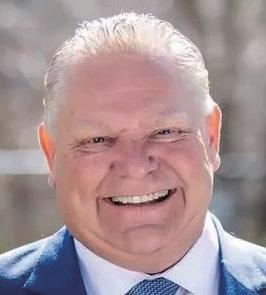
scales in their favour, and to stop us from gaining momentum,” the NDP said in one of its email messages.
According to the opposition party, “what Ontarians need right now is a government that gives power back to the people,” and an administration “that helps us with our
daily struggles instead of adding to them”.
In a scathing attack on Ford, whom Stiles wants to replace as premier, she said that “Doug Ford thinks government works for him, for his friends, for insiders. But government belongs to the people, and we’re going to bring it back to them”.
Stiles pledged that, as leader of an NDP administration, “we’ll make government work for you”.
The opposition said that “with whispers of an early election only getting louder”, it wants to be ready and is seeking help in the form of cash contributions “to run the biggest campaign anyone has seen from the NDP”, and to end conservative rule in Ontario.
“In the last six years, Doug Ford has done nothing to help the people of Ontario. Instead, it’s just one corrupt backroom deal after the other, one scandal after the other,” the NDP alleged.
“The only way we can defeat Doug Ford is if we raise enough money to at least match the spending of his party in the next election. It’s a tough challenge because he’s backed by wealthy Ontarians who exploit the Conservatives’ cash-for-access culture, each contributing thousands to secure power and personal favours,” the party added.
“If an early election is called this fall, we need to be ready to compete with their deep pockets. Otherwise, the consequences will be catastrophic for every day working people who always get the short end of the stick in a Conservative-majority Ontario.”
By RON FANFAIR
Canada was expected to be a pit stop for Roy Williams when he left Jamaica in 1951 to pursue higher education.
He says the plan was to go to the United States for his first degree, then to Canada for a Master’s, return south of the border for his PhD and head back to Jamaica to live happily ever after.
After completing a Business Administration degree in two years at Emmanuel Missionary College (now St. Andrews University) in Michigan, Williams enrolled in the University of Toronto’s Commerce program.
While at U of T, the Jamaican Canadian Association’s (JCA) Founding President fell in love and married in 1955, the same year he graduated.
“After that, plans changed,” he said. “I did another degree in Economics to do a doctorate in the discipline. In those days, you had to have two foreign
languages, one of which was German as a requirement to complete a PhD. I decided I was not going to do the doctorate.”
Having a wife to support meant Williams had to seek employment.
Getting a job was challenging as there were no responses to the dozens of resumes he sent for work in the field he studied.
With printing industry knowledge, having learned the trade at West Indies College which transitioned to Northern Caribbean University (NCU) in Mandeville, Williams sought employment in that area.
As a typesetting operator, he worked part-time at night while completing his Master’s. About nine months in the role, he was without a job when the company downsized.
Williams held a similar position at the Globe & Mail at night while working with Employment Canada before
deciding to make a career change.
Seeking to utilize his Business Administration degree, he applied to a Chartered Accounting firm in 1962 and was successful.
Set to start the position, the 1989 Harry Jerome Award winner received a surprise call from Ryerson (now Toronto Metropolitan) University.
“My wife took the message because I was not home at the time,” said Williams who taught accounting at NCU and fulfilled the requirements for a PhD without a thesis. “When I phoned on the weekend, the caller on the other line told me to come and see him right away because he had an opening to fill by Monday. I mentioned I was about to start a new job that same day and he re-iterated he needed someone in the classroom on Monday morning to teach Accounting & Law.”
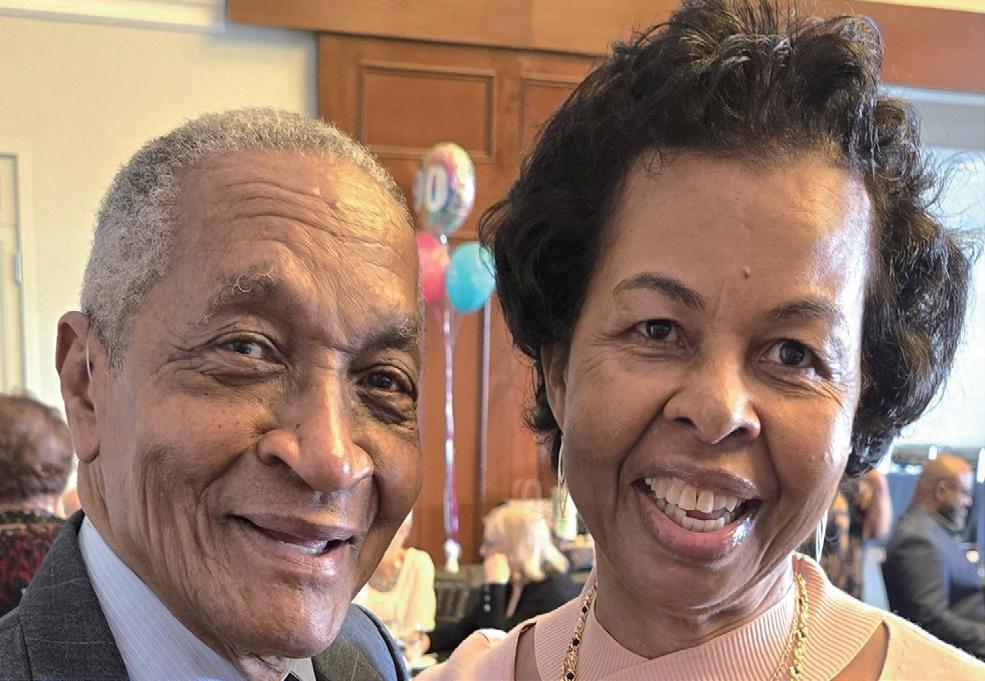
With the persuasion of Charlie Temple who was the Dean of the Ted Rogers School of Management from 1952 to 1970, he turned down the accounting firm’s offer and accepted the teaching position.
At around the same time, Williams met Esmond Ricketts, a music teacher who served in the two World Wars.
The ardent Garveyite was
an active member of the United Negro Improvement Association, the Negro Citizenship Association and the United Negro Credit Union.
With Jamaica transitioning from a British colony to an independent state, Ricketts – who died in 1971 – insisted that Jamaicans in Toronto get together to celebrate the momentous occasion.
An ad hoc committee
comprising of Williams as the Chair, Ricketts, Bromley Armstrong, Phyllis White, George King, Catherine Williams, Leyton Ellis and Kenneth Simpson planned and executed the historic celebration at the King Edward Hotel on King St. E. on August 6, 1962, the same day Jamaica achieved its independence.
“This was the first time that a hotel in Toronto rented their facility to a Black group,” said Williams. “That was huge for us. Representatives from the federal, provincial and municipal governments attended. We had a good time and the ad hoc group suggested we become an association.”
Armstrong chaired the Constitution Committee and the draft was accepted at a meeting in September 1962 at the then YMCA building at 40 College St. which is now the site of Toronto Police Service headquarters. See WILLIAMS Pg. 15
As a child who enjoyed watching ‘Bonanza’, ‘Lost in Space’ and ‘The Twilight Zone’ in the early 1960s, Tonya Williams did not see anyone looking like her on screen.
“At the time, I did not realize the damage it was causing,” she said. “It is when you get older and you start to feel invisible. It is like you are not a valued person on this planet.”
Williams quickly noticed actors’ impact on society after appearing in the ‘Wear-AMoustache’ Milk campaign commercial and ‘Polka Dot Door’, a Canadian children’s TV series.
“All of a sudden, kids seeing someone of colour on television for the first time are coming up to me,” she said. “Those things motivated me to want to do more. It also gave me a sense of responsibility. I knew that when someone takes a photo of you or you are on screen, that image is forever.”
Best known for her role as Dr. Olivia Hastings on the daytime drama, ‘The Young and the Restless’, with which she was associated for 23 years, Williams founded the Reelworld Film Festival in 2000 to showcase Canada’s diversity and provide a platform for visible minorities to display their artistic talent and, in the process, motivate audiences through film.
For the groundbreaking initiative, she was recognized with a Changemaker
Award on May 31 for promoting and amplifying people of colour in the media.
Marsha Greene, the showrunner of the Emmy-nominated, Black-led TV series, ‘The Porter’, made the presentation at the Canadian Screen Awards.
The daughter of immigrants who did not understand the business of film and television often found it challenging to explain to them what success would look like.
Invited by Williams for lunch about a decade ago, Greene seized the opportunity to take a photo with the accomplished Canadian actress.
“That was my opportunity to let my parents know that I made it,” she said. “Growing up, Black representation on television was still rare and just seeing Tonya on our screen gave us hope. But she knew she could use her platform to do more.”
In 2016, Reelworld entered an agreement with Telefilm Canada that paved the way for emerging filmmakers selected for its Emerging 20 (E20) program to qualify for Telefilm’s micro-budget program that offers up to $125,000 in funding.
E20 connects some of Canada’s most talented diverse talent with industry executives and professionals in the Canadian entertainment industry.
Canadian storytellers Supinder Wraich, Adrian
Wallace and V.T. Nayani completed the program.
“Tonya deserves this award because she has made a significant change,” said Wraich, whose drama web series, ‘The 410’, was accepted into Telefilm’s Micro-budget program. “I am so grateful that a woman like Tonya exists to give so many of us the path that we have. She is a visionary.”
Adrian Wallace was a program participant in 2020.
“I was very fortunate to have been put in a program so very early in my career that helped set me up and catapult me to where I am now,” the filmmaker said.
Nayani received funding for her first feature drama, ‘This Place’, which premiered at the 2022 Toronto International Film Festival.
“Reelworld was the first festival that prioritized Black, Indigenous and People of Colour storytellers and filmmakers,” she said. “Thank you so much for championing us. So many of us would not be here without your support and belief in us.”
By filling a void, maxine bailey said Williams has impacted thousands of people.
“She is passionate, she is strong, she is focused and she doesn’t take no for an answer,” the Canadian Film Centre’s executive director said.
While with a group of students a few years ago, television personality and film director Sharon Lewis was shocked when Williams
gave her phone number to the young people.
“She told them they could call her anytime and she would give them advice,” the Canadian Screen Award winner recalled. “Who does that?”
Williams, said publicist Kevin Pennant, has had a profound impact on Canada’s cinematic landscape by providing opportunities to individuals who may not have had access to the industry.
“Through Reelworld, Tonya has helped change the lives of many by offering platforms for underrepresented voices to be heard and stories to be shared,” said the founder & Chief Executive Officer of Pennant Media Group Ltd. which was launched in 2002. “Her dedication to promoting diversity and inclusion in the film industry has not only created opportunities for emerging talent but has also enriched the cultural fabric of Canadian cinema.”
There are growing pains associated with doing anything for the first time. It did not take Williams long to find that out.
“Putting together the inaugural event was a nightmare,” she said. “I had no idea what I was doing. I relied on others I thought knew more than I did only to find out they didn’t. What I however knew from the start was that I wanted a racially diverse Board of Directors. Everywhere I had gone and everything I had seen, there
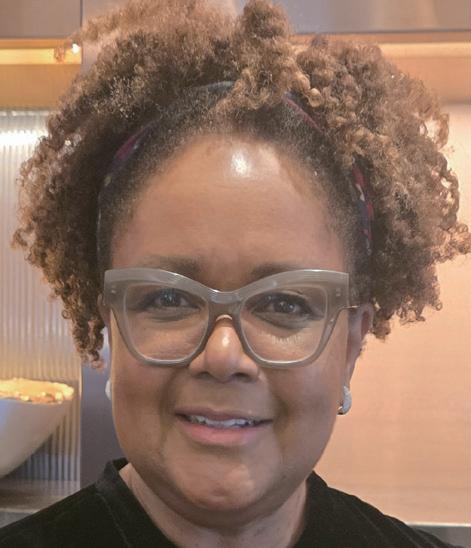
were always White people doing things for people of colour. I wanted us to do something for ourselves. I pulled together people who had never sat on Boards. None of us knew what we were doing.”
For the first festival at Kennedy Commons AMC Theatre that closed in 2012, Williams put up $100,000 of her own money.
At the end of the event in April 2001, Reelworld was $100,000 in debt.
“People spent money thinking money was coming,” said Williams who, in 2017, was the recipient of the Special Jury Award of Distinction presented to a woman who is a ground breaker and has demonstrated a commitment to the screen-based industry. “I paid off that debt and took full ownership of the Festival. I cut down on spending and people thought I was mean. Things were hard, but I had already imagined even harder things. Things got better as we went on even though
I completely exhausted myself and was burnt out.”
For the third festival, she put in another $100,000. In the first two decades, the budget did not exceed $400,000.
It is only in the last four years since the George Floyd murder that Reelworld has benefited from government funding.
Two years ago, the organization received $1.4 million from the federal government to run a training program for Black casting directors, agents, managers and producers in Canada.
“For years, I have been trying to get funding to create a program like this,” said Williams who spent four weeks every summer in Jamaica from age 12 to 18. “In the first year of the festival, I reached out to the various levels of government, begging to start collecting data and was told we could not do that because it is against the law. Now we do that all the time.”
Not seeing Black, Indigenous and other people of colour in Canadian film festivals drove her crazy because she knew that was a barrier to securing funding.
That is why Williams started Reelworld.
After the first year, she realized people needed training.
“I went to Toronto Metropolitan University for Drama,” she said. “What you learn there is not what helps
By RON FANFAIR
Pamela Appelt, Canada’s first Black female Citizenship Court Judge in 1987, has been appointed to the Order of Canada in the Officer category.
Officers are appointed for achievement and merit of a high degree, especially service to Canada or to humanity at large.
“I am humbled by this appointment which lets me know that I am on the right path,” said Appelt. “I am so blessed to be in a position where I can be effective, open doors for others and be a true Canadian.”
In the early 1960s, she went to England to further her education and join her parents who were part of the Windrush Generation.
While pursuing post-graduate studies, a professor encouraged her to consider attending McGill University. He figured Appelt would benefit from training under the late Professor Terry Wood who had done advanced work in diabetes.
Arriving in Canada in 1965, she was a biochemist at Queen Elizabeth Hospital and a researcher in Medical Biochemistry at McGill University in Montreal before transitioning to community service.
In the last six decades, Appelt has delivered countless hours of volunteer service and given thousands of dollars to scholarships and community initiatives without expecting anything in return.
Also appointed to the Order in the Member category are filmmaker Sylvia Hamilton and philanthropist and medical doctor Budhendranauth Doobay.
As the first high school graduate from Beechville in 1968 to attend university, much was expected of Hamilton.
The Nova Scotian hasn’t disappointed.
After graduating from Acadia University with her first degree, Hamilton started working in social and community development at an alternative school for high school dropouts in Halifax and with community-based organizations across the country through Company of Young Canadians in the 1970s and, in the 1980s, she managed programs at the federal department of Secretary of State in Halifax.
As a trained journalist, she worked for private radio stations and freelanced with the CBC (Canadian Broadcasting Corporation) before transitioning to filmmaking to visually convey the life experiences of African Nova

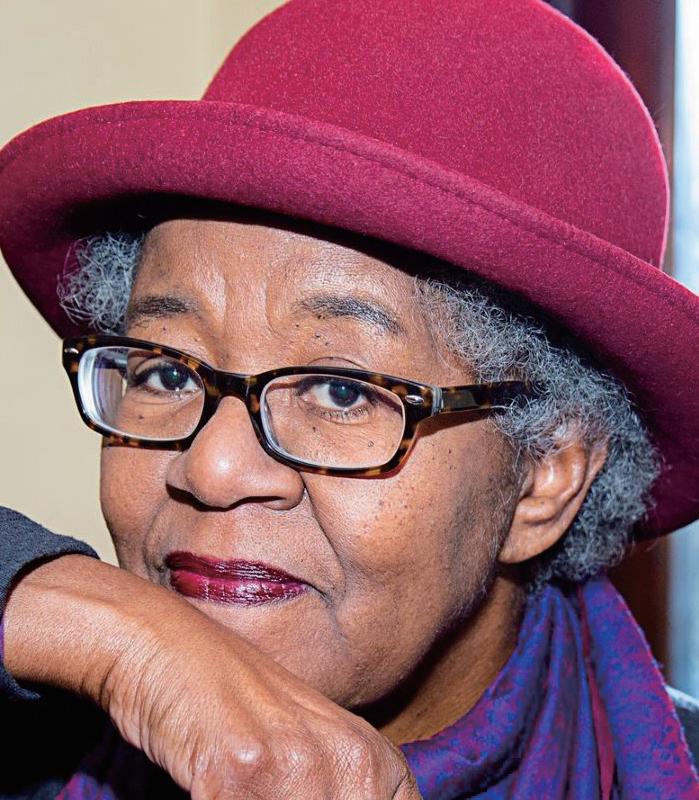
Scotians to the mainstream of Canadian arts.
Hamilton’s first documentary, ‘Black Mother Black Daughter’ explored some of the powerful women that shaped her life and Nova Scotia’s Black community.
Other important films that Hamilton directed include ‘Speak it: From the Heart of Nova Scotia’ (NFB) that voices the concerns of African Nova Scotian young people struggling with questions of identity, race and empowerment and was recognized with a Gemini Award in 1994 and ‘Against the Tides: The Jones Family’ that explores the history of Blacks in Nova Scotia through a family.
Through her company, she has directed and produced ‘Carrie Best: Champion For Human Rights’, ‘Thomas Peters: Man of the People’ which is the untold story of the Black Loyalist leader and his quest for freedom for Black Loyalists and ‘The Little Black School House’ that looks at segregation in Nova Scotia and Ontario schools.
Hamilton is also the recipient of honorary doctorates from Saint Mary’s, Acadia and Dalhousie universities. At Dalhousie, she served on the Transition Year Program’s (TYP) advisory board and supported the law school’s Indigenous Blacks & Mi’kmaq Initiative (IB&M).
To celebrate the university’s bicentenary in 2018, Hamilton made the list of 52 Dalhou-
CONTINUED FROM Pg. 6
In March 1796, the Maroons agreed to have discussions with the British. The British colonial governor in Jamaica had promised leniency if the Maroons surrendered. He reneged and instead captured and deported (to Nova Scotia) the entire Cudjoe’s Town/ Trelawny Town Maroon community.
These proud freedom fighters who had managed to evade enslavement were forced to board three ships which sailed from Port Royal Harbour, Jamaica on June 26, 1796, and arrived in Canada almost one month later, on July 21 and 22, 1796.
The deported Maroons were unhappy with conditions in Canada and, in 1800, the majority left to travel to the British colony of Sierra Leone in West Africa.
The British abolished slavery on August 1, 1834, and in 1839, the first Maroons made their way from Sierra Leone back to Jamaica.
Mary Brown and her family, which included her daughter Sarah McGale and a Spanish son-in-law, sold off their property in Sierra Leone, bought a schooner, and set sail for Jamaica. They were accompanied by two other Sierra Leone Maroons, Mary Ricketts
and her daughter Jane Bryan.
Some of the Maroons returned to Jamaica to work on sugar plantations, where workers were desperately needed following the abolition of slavery. Many formerly enslaved Africans in Jamaica wanted to cultivate their own land rather than work on plantations. This resulted in a shortage of workers on the sugar plantations. The plantation owners turned to Sierra Leone for workers.
In 1841, the first ship to arrive in Sierra Leone seeking workers was the Hector. In September 1841, an agent in Jamaica noted: “The ship Hector and Brig Commissioner Barclay from Sierra Leone brought Africans and Maroons.”
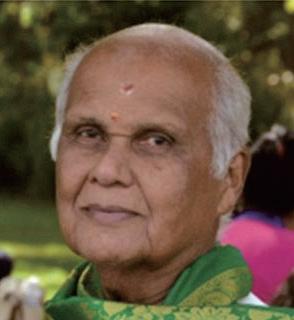
sie Originals who inspired, strengthened and at times challenged their university, communities, fields of study and the broader world.
She completed her master’s at Dalhousie in 2000. Her thesis, ‘African Baptist Women As Activists & Advocates in Adult Education in Nova Scotia’, examines the activities of African Baptist women in the latter half of the 19th century when there was an expansion of Black churches in the Maritimes.
A household name in South Asian homes across the country, Dr. Doobay represents not just a leader in the Hindu community, but an individual who recognizes the importance of religious freedoms and co-existence in the multicultural community.
As a cardiovascular surgeon, he spent most of his clinical career practicing at McMaster University as an assistant clinical professor, but his career expanded beyond his work in the operating room.
He built the first Hindu temple in Toronto and was at the core of developing the Hindu contribution to the beautiful multicultural city that Toronto has become. He helped organize parades of thousands of individuals during Diwali and built a Museum of Hindu Civiliza-
tion and World Peace, the only religious institution that houses icons of all the major religions of the world.
Doobay’s temple also built a Memorial for Fallen Canadian Soldiers, the only non-governmental body to honour their contribution to this country’s freedom.
His passion for health care and medicine led to his creation of a medical clinic in his late father’s hometown in Guyana for which he sends medications and aid. In addition, he oversaw the creation of a Dialysis clinic in Guyana.


















In total, 64 Maroons left Sierra Leone for Jamaica on the Hector. Most Maroons lived in Freetown, and by 1844, Freetown’s Maroon population shrank from 650 to 454, as approximately 200 Maroons returned to Jamaica.
Despite the return of some Maroons to Jamaica, others remained in Nova Scotia and Sierra Leone where their descendants still live.
tiakoma@hotmail.com




By RON FANFAIR
Jay Williams has been posthumously awarded the Ontario Physical & Health Education Association (OPHEA) 2023-24 Outstanding Contribution Award.
The Toronto District School Board (TDSB) educator died suddenly in the early hours of February 29. He was 40.
The award recognizes an individual, group or organization for their exemplary contribution to the lives of children and youth in the areas of inclusive health and physical education, health and physical activity promotion, advocacy and/or community development.
Born and raised in Toronto, Williams completed a Bachelor of Science in Public Health Education & Promotion at Dalhousie University where he played varsity basketball and was an assistant coach in his final year in 2007, and a Bachelor of Education two years later at Ontario Tech University.

He taught mainly Grade 8 in TDSB middle schools and was an Equity, Anti-Racism & Anti-Oppression coach for students from kindergarten through Grade 12 before joining the Centre of Black Excellence for Black Student Achievement last July as an equity co-ordinator.
Williams’ long-term contribution to improving the health and well-being of Ontario’s children and youth was exemplified by his collaboration with OPHEA.
Last year, the organization and the Centre of Excellence for Black Student Achievement collaborated to elevate Black youth voices in health and well-being narratives within schools.
Williams was a staunch supporter of this collaboration, demonstrating his dedication to shifting the narrative in Health & Physical Education towards inclusivity and representation.
His enthusiasm for the collaboration culminated in an in-person event for 70 Black youth a month after he died.
CONTINUED FROM Pg. 2
“OCAD U is already a place where people are doing design in many different ways and I am going to highlight some of the diverse design practices that people already have while encouraging them to dig deeper and create new ways of doing design so that we have a discipline that reflects the diversity of the world. In that way, people will feel much more empowered to celebrate design practices that are relevant to the communities they are from.”
Noel’s research interest focuses on individuals traditionally excluded from research, design-based learning and design thinking. She practices primarily in social innovation, entrepreneurship, education and public health. Always aiming to bring underrepresented voices into ev-
March 31, 1935 – July 14, 2023

A mother, a daughter A child of life. A teacher, an adjudicator And for a time, a wife.
A sister, a cousin And a friend who was dear.
Keeping in touch With frequency and cheer.
A musician, a producer
A team player, too.
A mentor who brought out The very best in you.
A fountain of knowledge, She shared it all. Through books, talks and song, To gatherings large and small.
A modest life
Anchored in philanthropy, She volunteered often Giving back to her country.
Died in July. On a day filled with rain. The likes of her We will not see again.
Yet she will live on Through her rich legacy. Just say her name: Joslynne Carr-Sealey.
Rest in eternal peace, Mummy. I love and thank you, Alicia.
eryday design education through social innovation, inclusive community-led research and public health solutions, she created ‘The Designer’s Critical Alphabet’ and ‘Who Am I Positionality Wheel’ to make conversations around race and bias more common in classrooms and work environments.
‘The Designer’s Critical Alphabet’ is a deck of cards to help introduce designers and design students to inclusive concepts.
“While doing my doctorate and a lot of critical theory reading and trying to figure out how to bring some of the concepts I had learned about my reading to other designers in a way that they would understand, I came up with the Alphabet which is a micro-sample of some theory and I end with a question to make the theory relevant from a design perspective,” said Noel who has honorary doctorates from the Pacific Northwest College of Art and the University of the Arts London.
“A lot of that work is about getting people to understand multiple points of view which has been a theme throughout my work and to get people out of their heads and just understand there are other questions they have to consider in the design process. Starting as my project, I am surprised how this Alphabet has evolved and the interest people have taken in it.”
Noel, who has also lectured at UWI and Stanford University, created the ‘Positionality Wheel’ to replicate a research method she learned in her PhD program.
“I learned this way of doing research which was about thinking and reflecting on who you are and your positionality,” she said. “In my PhD research, I learned to write a three-page essay about myself before I did the work I was doing.
“I was trying to figure out how to make this accessible to designers who might not want to sit and write a threepage essay but could benefit as well from this whole thing of reflecting on their own identity.
“I created the wheel as a visual way of reflecting on the identity rapidly and made it available to the public.”
Noel also designed ‘Empathy Games for Children’ which is a deck of cards with activities to assist children in empathizing with each other.
With books being important for research, she authored ‘Design Social Change’ in which she shares essential design strategies for making a lasting impact and co-edited ‘The Black Experience in Design: Identity, Expression & Reflection’.
Turned on to design at age 11, Noel expanded her design education in Brazil because there wasn’t an undergraduate degree program in the field at the time in T & T.
She did undergraduate and post-graduate studies in Graphic and Industrial Design at the Universidade do Norte do Parana.
“After applying to schools in North America, I quickly realized there was no way I could pay for tuition,” said Noel who co-founded and co-chaired the Design Research Society Pluriversal Design Special Interest Group. “Somewhere along the process, I met someone from the Brazilian embassy in Trinidad who suggested I apply to a program that allows students from Trinidad & Tobago to study in Brazil. My parents (Kenty & Sonia) supported me, saying I could come back home if I didn’t like it. I have always had that support in my life that I can take risks and know that failure is an option and I could start over if things don’t work out.”
After six years in Brazil, she returned to the twin islands republic and completed a post-graduate diploma in Arts & Cultural Enterprise Management at the UWI St. Augustine campus, an Executive Master of Business Administration at the Arthur Lok Jack Graduate School of Business and a University Teaching & Learning Certificate at UWI before pursuing a PhD in Industrial & Project Design at North Carolina State University.
Her PhD research focused on teaching and learning design through a critical lens at a primary school in rural Trinidad & Tobago.
“An emancipatory theoretical perspective guided the study, one aim of which was to challenge the current primary education paradigm in Trinidad & Tobago and to present a viable alternative that builds on the pedagogical style and content of design classes,” said Noel, who enjoys gardening, kayaking and walking.
Before relocating to the United States, she spent two decades at UWI in various capacities. She taught Portuguese at the Arthur Lok Jack Graduate School of Business and was a Visual Arts lecturer.
Her students included T & T product designer/photographer/curator Arnaldo James.
“Dr. Noel was my design lead lecturer from 2009 to 2011 and, to date, she remains a trusted critical advisor to my academic and professional career,” he said. “Impeccably professional as an instructor, her teaching approach equipped me very well as a multidisciplinary designer and academic. She continuously motivates me to invest my best in what I attempt and has been instrumental in propelling my growth during my time as a student and well after graduation.”
Married in May 2023, Noel has a son who completed Grade 10 this semester.
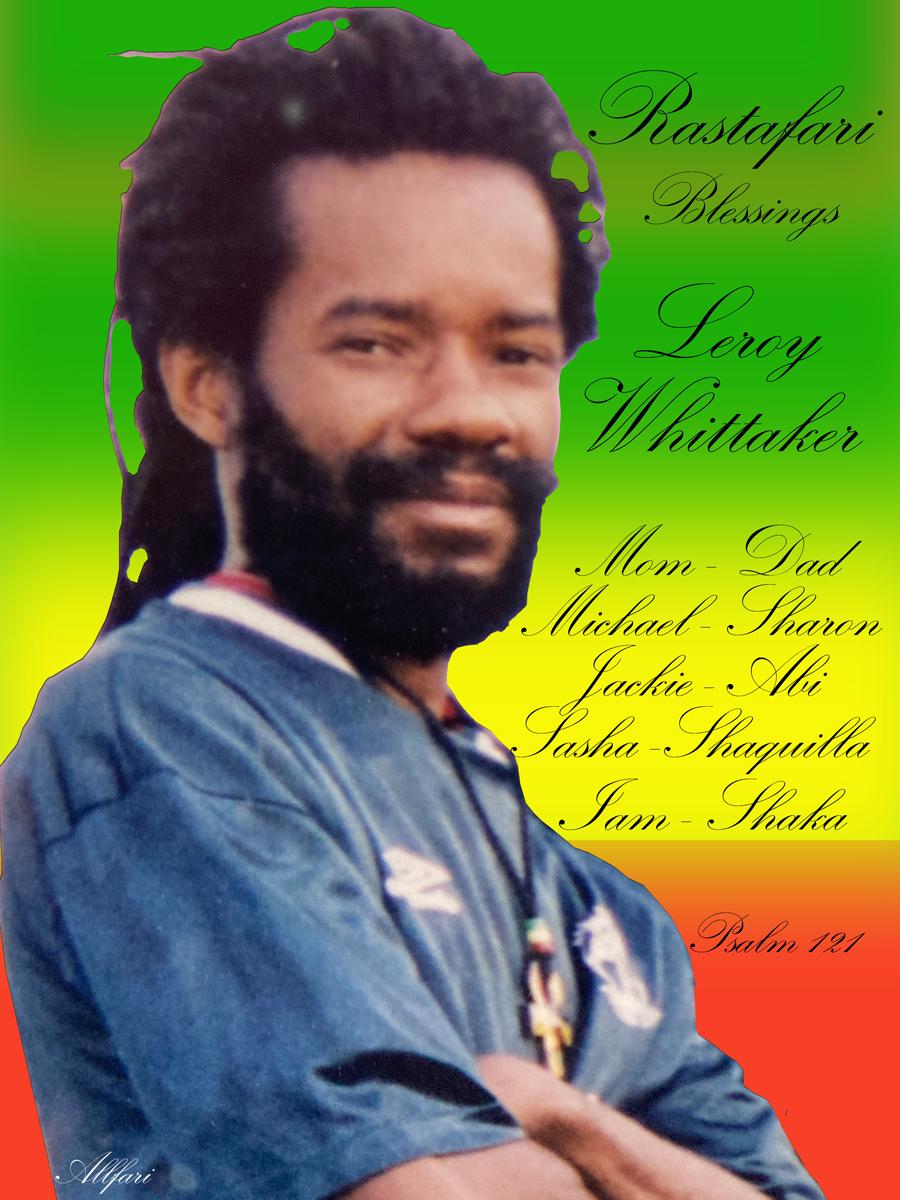
By LINCOLN DEPRADINE
Officials and volunteers of The Walnut Foundation (TWF), like so many other Canadians, are supposed to be using July and August as a period of summer relaxation and fun.
Instead, TWF – a “dedicated men’s health interest and prostate support group focused on increasing awareness about the heightened risk of prostate cancer among Black men” – is continuing with a series of health clinics that offers free prostate cancer screening.
Up to April, more than 300 men were screened, through blood testing, as a first step to identifying the possibility of prostate cancer and to “catch the cancer – especially the aggressive ones – before it’s too late”, said TWF president Anthony Henry.
“PSA: Detect & Protect” is the title of the clinics.
The clinics are a collaborative effort involving TWF, Princess Margaret Cancer Centre and several community service organizations.
Organizers provide free PSA – prostate-specific antigen – blood testing for

men 40 years and older.
In the PSA test, a sample of blood is taken and analyzed and an early diagnosis could be made on whether cancer is


present.
TWF’s next screening session is this Saturday, July 13, 10 a.m. - 3 p.m., at the Imdadul Islamic Centre, 26 Lepage Court, North York.
Henry is encouraging Black men, who have never had a PSA blood test, to take advantage of the free screening. But he would like them to register in advance of attending on Saturday.
“This one is going to be at the mosque and people have to pre-register for this; you can’t just show up,” he emphasized in an interview with Share.
“The hospital has to book staff; they can’t just send resources off willy-nilly if nobody is going to show up. So, they need commitment upfront for this one.”
Registration information is available by calling 416-568-7442 or 905-799-2759.
Research indicates that Black men may be genetically predisposed to prostate cancer, have a higher risk of developing the cancer, and are more likely to experience more severe disease at a younger age.
TWF, a not-for-profit organization established in 2007, aims to increase awareness in the Black community about prostate cancer. Early detection, members say, saves lives.
The foundation, which also provides information about diagnosis, treatment and follow-up practices, has released statistics showing that a Black male is diagnosed with prostate cancer “every 13 seconds”; that “one in six Black men will be diagnosed with prostate cancer” and that “Black men are two times more likely to die from prostate cancer than other populations”.
As well, reports are that prostate cancer accounts for one in five male can cers in Canada, however Black men have three times the risks of having more aggressive disease than Caucasians.
Henry told Share that, following Saturday, TWF plans to hold another health clinic this month, on July 20 at Brampton City Hall.
“Brampton is a big one. There’s a big community health fair going on that
day in Brampton,” said Henry.
“Even though we’ve kind of taken the summer off, in terms of meetings, there are still activities going on to meet our obligations like holding the screening, which are continuing.”
On June 1, TWF held its “10th Annual Walk-the-Path Walkathon”, with a fundraising target set at $100,000.
“Most of our funding comes from this walkathon. That’s where our base money comes from. The money will be allocated for awareness-building in the community around prostate cancer,” Henry said.
TWF produced about 13 educational videos last year. Henry said the foundation wants to do more videos this year, to maintain the health clinics, and also to set aside resources for the foundation’s support groups and community outreach.
The 10-kilometre walkathon, which followed a path through the Etobicoke Creek Trail at 30 Loafers Lake Lane, was attended by more than 420 people, including Brampton’s Mayor Patrick Brown and other Ontario politicians.
“That went very well and we’re pretty close to the target. We’re at approximately $87,000,” said Henry, a financial advisor by profession.
“We try to raise as much as possible by the event day. Then, the second part of the campaign is to follow up with people and to get those commitments of money from them by the end of the summer. We’re accepting donations until August 31.”















“There might not be any schools named after them, nor roads nor parks or libraries,” the 1993 Harry Jerome Award winner for Business Excellence said. “They might not have received an award as token recognition for their efforts. But, most likely, their names might have been recorded in Share so that future generations can learn about them and their efforts to make life better for all of us.
“As a dear friend reminded me, if our history is not written, it is as though we didn’t exist. Share proves that we existed.”
The paper has also been a starting point for several Black journalists who are excelling with mainstream publications. They include Donovan Vincent who is the Toronto Star’s Public Editor.
“The community paper brings you closer to the community,” he said. “Instead of covering institutions from a distance, you are actually out getting input from people in the community.”
Dr. David Mutimer, an Associate Dean in the Faculty of Liberal Arts & Professional Studies (LAPS), presented Auguste to convocation.
“Throughout his illustrious career, he has been instrumental in amplifying the voices of individuals of African and Caribbean descent while also nurturing cultural pride within the diverse communities of colour that have chosen Canada as their home,” he said. “Regarded as a pivotal figure in the contemporary landscape of ethnocultural and ethno-racial media, Auguste has dedicated his life to advocating for equality and social justice. His work exemplifies his dedication to access and inclusion and alignment with our faculty’s mission, embodying the ongoing goals of LAPS. His significant contributions to society serve as a model for others to follow.”
Mutimer said that Share is a trailblazer in facilitating public dialogue on minority issues.
“The newspaper is revered as a unifying institution in community artifact among different Black cultures,” he added. “Its success and impact highlight the importance of representation and empowerment in ethnic communities across Canada.
I BUY VINYL RECORDS CA$H PAID FOR YOUR RECORDS!

“Auguste’s commitment to community empowerment and social justice has earned him respect as a thought leader in the African Canadian community. His dedication to multiculturalism sets an example for us all.”
Back issues of Share newspaper are filed in York University’s Archives & Special Collections.
“Arnold is a modern trailblazer,” said York Universi-


ty’s President & Vice-Chancellor Dr. Rhonda Lenton.
York University Professor Dr. Carl James said universities have a responsibility to recognize outstanding community members who are making a societal difference.
“I think this recognition by universities of community members is quite appropriate and significant and I think we need to appreciate that,” said the Jean Augustine Chair in Education, Community & Diaspora.
Dr. Lorne Foster, a former Share columnist and a Tier 1 York Research Chair in Black Canadian Studies & Human Rights, played a pivotal role in Auguste’s nomination for the honorary degree.
“I have always respected and admired the contributions
over the years that Arnold and Share have made to the Black community in Toronto and Canada more widely,” said the Chair of the Institute for Social Research. “That contribution has not been adequately acknowledged.
“Through Share, he was able to help in the shaping of a more coherent voice for the Black community and to have that voice heard. I think that Arnold has been a little selfless and a little humble in that regard. It was important to me to have him publicly acknowledged as an important thought leader and community builder whose accomplishments rank among those in history who have advanced their people’s cause and at the same time improved the fabric of this society.”
CONTINUED FROM Pg. 6
you to navigate the real world, business-wise. This is not like getting a job and staying in it for years. You have to plan your whole life of work that will happen over a long period. I wanted to create programs that could facilitate that.”
The Reelworld Screen Institute is a training platform for curators/programmers, arts administrators, grants writers, theatre managers and publicists.
“People were constantly emailing me, asking if I knew someone for this job and that job,” said Williams who did comedy for 15 years before switching to drama. “That was not easy as I had to go to the Rolodex in my mind trying to think.”
To address that issue, Access Reelworld was launched in July 2020.
It is a transparent and searchable recruiting platform for Canadian BIPOC creatives in the screen industry.
“Even though there is this database, I still receive emails, asking if I can recommend someone,” she said. “It is just so much stuff.
“A broadcaster recently reached out to me, asking for a huge diversity thing they wanted. When I told them it was possible and inquired how much they would pay, they told me it would be good exposure for us.
“I can’t pay my staff in exposure. There are hard costs and I told them I was not going to eat that for their diversity program. There is still that frustration for me that people in the industry who are primarily White think people of colour are doing this as a hobby.”
Approaching the 25th anniversary next year, Williams plans to step back from Reelworld’s day-to-day activities by the end of December 2025.
“I will be 67 then and do not think I can be fully involved as I am now,” she said. “I am working on a succession plan, but that is hard. You can try and build one, but people are not always on your agenda. Those that I am investing in could leave for another job. I am worried because I see people in the community who have created things that die when they are gone. I don’t want that to happen with Reelworld.”
The Miss Junior Personality contest winner at age 14 did commercials in high school, was crowned Miss Black Ontario four years later in 1977 and spent a year in the Ryerson University drama program two years later after landing the lead role in ‘Love & Politics’ which was authored and composed by Mavor Moore who died in 2006.
She also co-hosted the Miss Teen Canada pageant, landed small television roles and worked in Canadian theatre for a few years before heading to Los Angeles in 1987 in search of a major acting role.
Unlike most Canadian actors who found the transition difficult, it wasn’t for Williams who modelled in Paris and Chicago before going to Los Angeles.
“It was challenging for those people who had lived their entire lives in Canada in one city and one town,” she said. “I travelled for the first time when I was two years old by ship. My parents were always in New York and we went to different places. I had moved around. For me, Los Angeles was just another city that I was going to try out. Trying new things is effortless for me because of the exposure I had when I was younger.”
Williams’ upbringing also prepared her for the sexual abuse and harassment prevalent in Hollywood.
“Of course, I encountered powerful people in the industry who asked me to meet them at their hotels and come up to their rooms,” she said. “My reply was
always, ‘How about us having breakfast at a restaurant in the morning because I will be there?’ Yes, I went to LA and yes, there were a lot of people hitting on me. My way of navigating that was to pretend people were not hitting on me because I still had to work with these people. I always made sure I was in situations where I did not have to fight off anyone.”
Most actors have role models in the industry they look up to.
For Williams, her idol was Diahann Carroll who surged to prominence in some of the earliest major studio films to feature Black casts.
She starred in ‘Julia’ which was the first series on American television to highlight a Black woman in a non-stereotypical role.
“I had never seen a Black woman on-screen until she came along,” said Williams who was named one of Canada’s Top 25 immigrants in 2012. “She was beautiful and eloquent. Years later when I was nominated for a NACCP (National Association for the Advancement of Coloured People) Award, she was there and I got the opportunity to meet her. I just wanted her to know that what she represented in that show meant a lot to me.”
Williams landed guest appearances in ‘Hill Street Blues’, ‘Matlock’, ‘Falcon Crest’, ‘What’s Happening Now’, ‘Generations’ and ‘A Very Brady Christmas’ before getting her big break in 1990 in ‘Young & the Restless’
The recipient of two Emmy nominations for Outstanding Supporting Actress in a daytime drama series, she hosted ‘Tonya Williams: Gospel Jubilee’ on CBC Television in 2004, led a diverse cast in Vision TV’s original comedy series, ‘She’s The Mayor’ and was cast in Clement Virgo’s ‘Poor Boy’s Game’. She also directed Trey Anthony’s ‘Da Kink in My Hair’ for Vision TV in 2004.
Born in England to Jamaican parents who were divorced, Williams spent seven years in the Caribbean island with her mother who was employed at the Jubilee Maternity Hospital. In 1966, Williams and her mother went back to England for four years before migrating to Canada.
Now 93, Korah Harrison is in a long-term care home in Toronto.
Williams’ father, Lloyd Williams, was a Supreme Court Judge in the British Virgin Islands and St. Kitts & Nevis before passing away in 2008.

but this was not the habit. Ninety per cent of my oxygen was spent on me time with kids, family, friends and sports. So, there was not much left for trials and tribulation of these folks in the police department that felt it is their duty to create misinformation and untruths about us Black officers in the hope that it will impede our progress up the ladder. For the most part the script was already written.
CONTINUED FROM Pg. 8 CONTINUED FROM Pg. 6
I was recommended for a community position by a Sergeant who concluded that I was the best person for that position. But he was threatened to be put back in uniform if he kept putting forward my name. He came to my home and spoke to my wife suggesting to her that she should encourage me to go out and play golf with the fellas and involve myself in other activities like that. She told him that he did not know me and that I was not going to do any of that. She was right. I then told the Sergeant that it was not an issue. The position can go to someone else. He insisted that I was the correct person for the position and that I should try to do what I can to get the position. I told him that I was comfortable being an officer the way it was and I was fine. The position was then given to an officer who had no interest in our community whatsoever and that is the way some of the higher authorities would prefer it to be.
Several times you will hear these authorities in the Police Department deny that any kind of racism exists. These folks usually have their own political agenda. So, we folks would be among the last that they would want to highlight. We are usually thrown under the bus. But I maintain that we have to keep loving our children, supporting our family and friends and support those who are trying to make a difference in our lives.
I do not expect all Black politicians to have specific interest in helping our community, but I believe that the majority will want to give some priority to improving things for us.
One example I can speak to deals with a popular Ontario politician that showed his true colours at an umpire’s cricket dance some years ago. He happened to be seated at the same table as me and two buddies. Without any urging, he volunteered his view that we Black folks beg too much. I took offence to this and I told him the programs that give to other groups, Italian, Greeks, Portuguese and so on, all come from our taxpayer dollars. I also asked what is the problem with Black groups getting assistance from the same taxpayers dollars? He never responded and did not say much more for the rest of the night. That’s when I said to myself that this politician who no doubt got lots of votes from Black folk is an obvious sellout.
This attitude is very prevalent even among the folks that we may think have our backs.
There is an officer who is retired now. He was given Policeman of the Year on two separate occasions. I met him one day and I asked him how come these folks who recommended him for Policeman of the Year twice never helped him get promoted to a higher rank? He did not have an answer to my question. I know this officer and he was very satisfied with that situation. He used to be a parking control officer and he became a police officer.
While at Police Headquarters one night to do a concert with the Police Association Male Chorus, I heard a Deputy telling him that he has come a long way. I took that to mean that since this officer is now an officer as opposed to being a parking control officer, that was great. This Deputy felt that this was a great achievement for the officer. So, the culture of not moving him up any further was alive and going well in this Deputy’s mind.
There are many examples of incidents that can show the culture of biases in policing that would hinder the progress of being promoted. Some of these folks in charge are devoted to practicing their biases.
While attending the University of Toronto,
I would preselect the day off to write my exams. In this one course, the professor was very strict about not allowing students to make up the final test if they missed. So, he instructed all of us to make sure that we have the days available to write the final exam. I did just that. I got to work the day before my final exam for this test and my day off was cancelled by this Staff Sergeant for no reason. However, my job came first and I missed the exam and failed that course. The day after, this Staff Sergeant had the unmitigated gall to approach me and actually put his hand around my shoulder and said that he would not do that again. I told him to take his F’king hand off me. The nerve. I had to redo that course. It was not a big issue in terms of me stressing over it.
The unforgettable Charles Roach had advised me previously to take my time to complete the Degree. He said I was young and had lots of time. I valued that advice and just retook the course.
I believe the playing field at present is much more level than years ago. I have taken many exams and for the most part had good marks. I still have a letter from the Police College acknowledging my efforts in one exam and the letter said that I would be hearing from them soon. I never heard from them. But as I said before, being promoted was not a driving force for me. I was satisfied being an officer and I relished the idea of helping folk when I met them on the job.
I found being a police officer to be very satisfying as a person in the community
and I tried to exhibit humility, empathy and concern each time that I would encounter the public. Some of the homeless folks were very surprised when I called them “Sir”. I was able to leave the job without any scars of the racists attitudes of some officers and I still have my faculties intact. I was blessed and protected as I put my trust in a higher power by reading Psalm 91 on a daily basis. So not being promoted, while it might have been a good thing moneywise, I have no regrets. I also hope that those who have been promoted saw benefits other than the money. But this is just a personal viewpoint. There is no jealousy here. I am very happy for those coming forward now who possibly have a better playing field from which to play the game.
Williams was elected the JCA’s first president.
Under his leadership, the new association created a credit union and advocated for a consular office in the city which was established in 1977 with the late Oswald ‘Ossie’ Murray as Consul General and Leonard Coke as Consul.
The JCA quickly became a voice for Blacks and other minorities facing discrimination.
In late 1962, a young Black woman who resided on Drewry Ave. in North York was on her way home from the afternoon shift at the Canadian Broadcasting Corporation (CBC) when she was detained by police.
“They wanted to know what she was doing in that part of the city at night,” recalled Williams. “She didn’t know who to turn to, so she came to us and we made our first intervention. We went to the police station to get answers. It was at that point that we saw a need for us to look out for new immigrants coming to the city who were not treated properly.
“In many cases, people were rejected when seeking housing. They were also told they were overqualified or not qualified for jobs. Children coming from the Caribbean were placed in Grades lower than the ones they should have been in.”
Advocating for Blacks on agencies, boards and commissions led to Williams being appointed a board member of Ontario Place Corporation. The new position opened the door for him to hobnob at social events with some of the city’s influencers.
Invited by then Toronto Police Service Board (TPSB) Chair Clare Westcott (he celebrated his 100th birthday last month) to a luncheon to mark Murray’s retirement from the diplomatic service in 1986 after 14 years in Canada, the last 10 as Consul General, Williams overheard a conversation around his table about finding a suitable Black person to sit on the police board.
“When I got back to my office, I received a call from then Ontario Premier David Peterson’s political assistant Trevor Wilson, requesting I send them my resume right away,” he said. “At the same time, Bromley was raising hell, badgering Peterson about appointing someone from the Black community to fill the position.”
Williams made history in 1987 as the first person of colour appointed to the TPSB.
The early days were extremely challenging for the trailblazer who played a role in the 1989 appointment of Tom Sosa as Ontario’s first Black deputy minister.
Stopped by police on his way home one evening, he was charged with obstruction
after failing to hand over his car keys to an officer.
“I was given a conditional discharge by the Judge and when I returned to my Board duties, some members openly said there is a criminal on the Board,” said Williams who was a member of the Race Relations & Policing Task Force headed by Clare Lewis. “When the Chair inquired what happened, I bluntly told him the police lied, and went on with the work of pushing for the Service to hire and promote visible minority and female officers.
“When I joined, the Chief presented a list of promotions that the Board rubber stamped. When I inquired if there were visible minorities on the list, the Chief would say he doesn’t know. When he asked if I would like to know, my reply was ‘Yes’.”
While on the Board, Williams took a lot of flak for supporting late community activist Dudley Laws who co-founded the Black Action Defence Committee (BADC) in 1988 after police fatally shot Lester Donaldson.
Arrested in 1991 for allegedly smuggling illegal aliens into the United States, Laws won an appeal and the charges were dropped in exchange for him doing community service. The Toronto Police Association also sued him that year for defamation.
“At the end of a community meeting where Dudley’s harassment by police was discussed, I suggested we create a fund to help with his legal expenses,” Williams said. “A reporter picked up the story and the headline in one of the mainstream newspapers was that the Toronto Police Association head said I should resign. At around the same time, I owned a house on Madison Ave. and had some difficulty getting a permit to do some renovations. I was off the Board for a while before returning.”
The shrewd businessman, who owned real estate, entertainment, ethnic foods and beauty salon businesses in the city, stepped down from the Board at the end of his second three-year term in 1993.
A year later, Williams retired from Ryerson after 34 years and returned to Jamaica in 1995 where he served as a Professor of Management & Organizational Behaviour at NCU until 2007 when he came back to the Greater Toronto Area.
After his term as JCA President expired in March 1966, Williams’ involvement with the organization was minimal for 14 years until his return in 1980. Serving on the executive and social committees, he was elected president for a second
time in 1984.
During his five-year tenure, the JCA acquired a building in 1985 at 1621 Dupont St. and, three years later, became a United Way member agency. The organization also joined other global groups in denouncing South Africa’s apartheid regime.
At the start of his second term, the JCA occupied a small two-room office on Dufferin St. with no permanent staff. When he left, the organization has its own building with a manageable mortgage, eight staff members in three locations and a vibrant Senior Citizens group.
“I am proud of bringing the JCA to a position through the 1980s to the early part of this century as an organization that spoke out for the community,” said Williams, who authored ‘The Jamaican Canadian Association: Portrait of a Community Organization’. “The JCA is a brand that has and is doing great things for the betterment of people. We have our own building which is a meeting place and hub for the community.”
Proceeds from the sale of the building at 1621 Dupont St. and a $368,000 bank loan were used to purchase the JCA’s current headquarters at 995 Arrow Rd.
Celebrating his 95th birthday last April 22, Williams remains active.
The staunch Seventh-day Adventist attends church on Saturdays and some community events. He also spends an hour three times a week in his condo gym on the treadmill, rowing machine and the stationary bike.
“When I was 87, I was lying in bed when I saw a promotional video on television, encouraging seniors to participate in some physical activities,” said Williams who supports several charities. “That was when I decided I would use the gym in my building which I had never used before.”
With his first wife, Catherine Williams, who is deceased, the couple had four children. He and his second wife of 36 years, Grace Williams, have one child.

